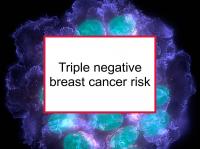A new study has reported that the more children a woman has, the more likely it is that she will develop triple negative breast cancer rather than ER+ breast cancer. Triple negative breast cancer is a subtype of breast cancer that is ER-, progesterone receptor negative (PR-), and human epidermal growth factor receptor 2 (HER2) negative.
The study was designed to investigate associations between reproductive and menstrual history, breastfeeding, birth control pill use, and risk of breast cancer according to subtype. Triple negative breast cancer occurs disproportionately among African American women compared with non-Hispanic white women and is associated with a worse prognosis than ER+ breast cancer.
Since triple negative tumors do not depend on estrogen, it has been assumed that reproductive factors are not likely to strongly influence the risk of this cancer subtype.
To conduct the study, the authors used data concerning 155,723 women enrolled in the Women’s Health Initiative. This population included 307 triple negative breast cancer cases (reflecting the relative rarity of this subtype) and 2,610 ER+ cases.
Never having given birth was found to be associated with a 40% reduced risk of triple negative breast cancer, but a 35% increased risk of ER+ breast cancer. Rates of triple negative breast cancer were 2.71 per 10,000 person-years in mothers and 1.54 in women who had not given birth. On the other hand, rates of ER+ breast cancer per 10,000 person-years were 21.10 in mothers and 28.16 in childless women.
Among mothers, a higher number of births increased the risk of triple negative breast cancer whereas having more children reduced the risk of ER+ breast cancer. Young age at first period and late menopause were only modestly associated with risk of ER+ in the study population and not associated with triple negative disease. Breastfeeding and oral contraceptive use were not found to be associated with either subtype, contradicting previous study findings.
The authors conclude that the association between having given birth and breast cancer risk differs significantly for ER+ and triple negative breast cancers. The biological mechanisms underlying these differences are uncertain.
Comments regarding the study
Since triple negative breast cancer is relatively rare, having given birth is associated with reduced risk of breast cancer overall. The finding that a higher number of births heightens the risk of triple negative breast cancer suggests that women who have already been diagnosed with triple negative breast cancer might increase their risk of recurrence by giving birth after completing their treatment.
Please see our articles on triple negative prognosis and what triple negative patients and survivors should eat more information on triple negative breast cancer.
